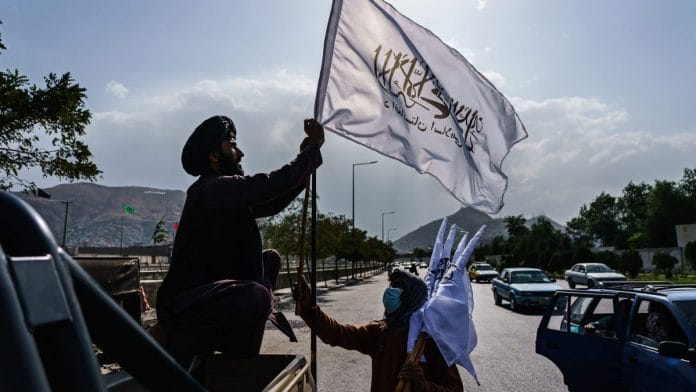Exactly two years after the inception of the Taliban’s political office in Qatar, in 2015, the Islamic State, known as ISIS, announced the establishment of the Khorasan branch, ISIS-K.
During the years of United States’ presence in Afghanistan, amid intense conflict, the world obtained irrefutable evidence — from the assassination of al-Qaeda leader Osama bin Laden, the death of Mullah Mohammad Omar and the assassination of Mullah Akhtar Mohammad Mansour in Pakistan — highlighting the intimate relationship between the Taliban and Pakistani government.
It was from here that the world unanimously exerted pressure on Islamabad to bring the Taliban to the negotiating table. After much insistence and denial, Pakistani officials were compelled to strike a deal with the United States to do it, leading to the establishment of the political office in Qatar.
Pakistan’s agreement with the United States constitutes overt and covert changes in the country’s policy toward Afghanistan, which Pakistan put as a bargaining chip on the table in exchange for a deal with the Americans.
The killing and ousting of the leaders and followers of the Tehreek-e-Taliban Pakistan (TTP) in eastern Afghanistan were claimed by Pakistan, who, according to the former spokesperson of the Taliban, was sheltered by the Afghan National Security Agency and supported by the Indian government via financial and arms assistance. As a result of the agreement, the US bombed all of their hideouts in eastern Afghanistan, killing the group’s leader, forcing all to leave Afghanistan.
Also Read: In Afghanistan, extremists are targeting extremists. But the one in Kabul has no vision either
Pakistan’s new strategy for Taliban
Pakistan’s new strategy is to divide the Taliban into moderates and hardliners and maintain its shadow of influence over both branches. The moderate Qatari Taliban are under pressure from both sides, including the international community, to form an inclusive, rights-respecting government. However, such a government would come at the cost of the Taliban compromising principles and values that the group has fought for in the last two decades. The dilemma facing Taliban leaders will lead to one of two scenarios.
The quest for international recognition could further divide the group as the Taliban hardliners would likely feel alienated from the leaders who are seeking to opt for a more moderate stance to gain legitimacy. If the leaders opt for moderation, they will likely see a large decline in the ranks of their group among the hardliners. And if they seek to satisfy the hardliners, they will lose the support of the world and become isolated. In both scenarios, war-torn Afghanistan is doomed to remain a battlefield.
For this reason, the Pakistani military intelligence agency, the Inter-Services Intelligence (ISI), has already identified the ISIS-K. This is where many from the Afghan Taliban, who are dissatisfied with the group’s agreement with the US and consider the negotiations a violation of their jihad, go. With the emergence of this group, Pakistan will no longer be subjected to international pressure as ISIS is an Arab phenomenon that Pakistan had no role in creating.
Also Read: Enemy of my enemy? ISIS-K violence could force West into an unlikely alliance with Taliban
Support for ISIS-K’s survival
A brief look at the history of ISIS also reveals what operates in Afghanistan under the name of ISIS-K requires financial resources, weaponry, and a safe haven for its survival. However, ISIS-K is operationally very different from other terrorist networks in the world. It is an extremist Sunni group seeking to revive the caliphate, which requires resources, including land, to achieve this goal. The territories in which ISIS operated were countries where Sunnis are a minority and power had been concentrated at the hands of Shia rulers. The geography and composition of Afghanistan, a Sunni majority and the Shiite minority country, would prevent ISIS-K from establishing a stronghold in the country. Further, the only border that Afghanistan shares with the Middle East is Iran, which staunchly opposes ISIS in the region. However, ISIS-K has been operating in the eastern provinces of Afghanistan, along the Pakistani border, because it requires weapons and shelter from Pakistan. For these reasons, ISIS-K has been propped up to prevent the re-emergence of the TTP.
However, the US-Taliban agreement does not address the ISIS-K threat, which will likely cause it to re-emerge. The group’s activities in eastern Afghanistan and the border with Pakistan has enabled it to have enough fighters to prevent the return of the TTP in these areas, which has gained momentum in recent months. Moreover, due to the ISIS-K threat, the Taliban would likely cooperate with the US and NATO for intelligence-sharing purposes, leading to the presence of international special forces in Afghanistan, to tackle ISIS-K. This would enable the United States to maintain a limited and strategic presence in Afghanistan. Through its presence, the US could monitor, via satellite technology, Russia and China — all the more a reason to maintain a presence in Afghanistan.
Baktash Siawash is a journalist and was the first youngest elected parliamentarian in Afghanistan. He previously served as the Senior Political Advisor to the Speaker of the House of the People. Views are personal.
(Edited by Srinjoy Dey)






